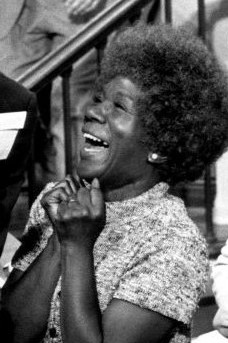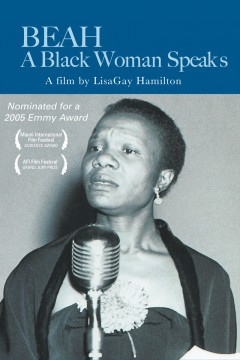When Beulah Elizabeth Richardson was born on July 12, 1920, in Vicksburg, Mississippi, life was not easy if you were black. Her mother was a seamstress, a common career for married women at the time, but also an advocate for education working with the PTA. Her father was a Baptist minister.
To pursue an acting career, Richardson changed her name, a common thing for people in the entertainment industry. As Beah Richards, she would tackle provocative roles on stage and screen.
She was very active on screen from 1958 to 2000, with 76 acting credits in film and television. Among her 14 film credits is her memorable role as Mrs. Prentice from Guess Who’s Coming to Dinner (1967). Richards also acted in 14 TV movies such as Footsteps (1972) and As Summers Die (1986). She was a guest star or a recurring role in 46 TV series such as ER (1994-95), Hearts Afire (1992-93), and Dr. Kildare (1966). In almost all of these roles she played a mother or grandmother, but one that spoke out and stepped up to defend what was right and just.
In life Richards spoke out on racial justice and for gender equality. The 2003 film Beah: A Black Woman Speaks highlights the struggles she faced as a black actress and an activist for civil rights.
While her poetry and plays focused on civil rights for African-Americans, her words could also speak directly to white women, pointing out how much sexism and racism harmed them as well. You can listen to her poem “A Black Women Speaks... Of White womanhood, Of White supremacy, Of Peace" at this link, or you can watch it below:
<iframe width="560" height="315" src="https://www.youtube.com/embed/xJnpWUgOLHk" frameborder="0" allow="autoplay; encrypted-media" allowfullscreen></iframe>
Richards was a gifted writer. In the film about her life, she reads several of her poems. Her 1974 collection of poetry A Black Woman Speaks presented 14 of her poems. While it may seem like 14 poems are not much, each was a work of passion, including her 1951 three-part poem “Genocide,” which was constructed as call-and-response with voices and choruses frankly stating the brutal realities of life for African-Americans. The title of the collection became strongly associated with Richards for the rest of her life.
Richards was also a playwright with three works that made it to the stage. It took decades before her first two plays were performed, but even then, the issues they dealt with were still a reality. The first play, All’s Well that Ends Well, tackled racism and the realities of segregation. The second, One is a Crowd, gave voice to the fact that continued injustice can lead to a desire for revenge on the personal level. Finally, An Evening with Beah Richards was her one-woman play, which ran in 1979.
Richards directed a few plays and taught courses on theater at the university level several times in her life. In 1974, in recognition of her theatrical work as actor, writer, director, and educator, she was inducted into the Black Filmmakers Hall of Fame.
In 2000, Richards won an Emmy Award for her guest performance on The Practice, a legal drama that ran on the ABC television network from 1997 to 2004. She died only a few days later at the age of 80 back in Vicksburg, Mississippi.



